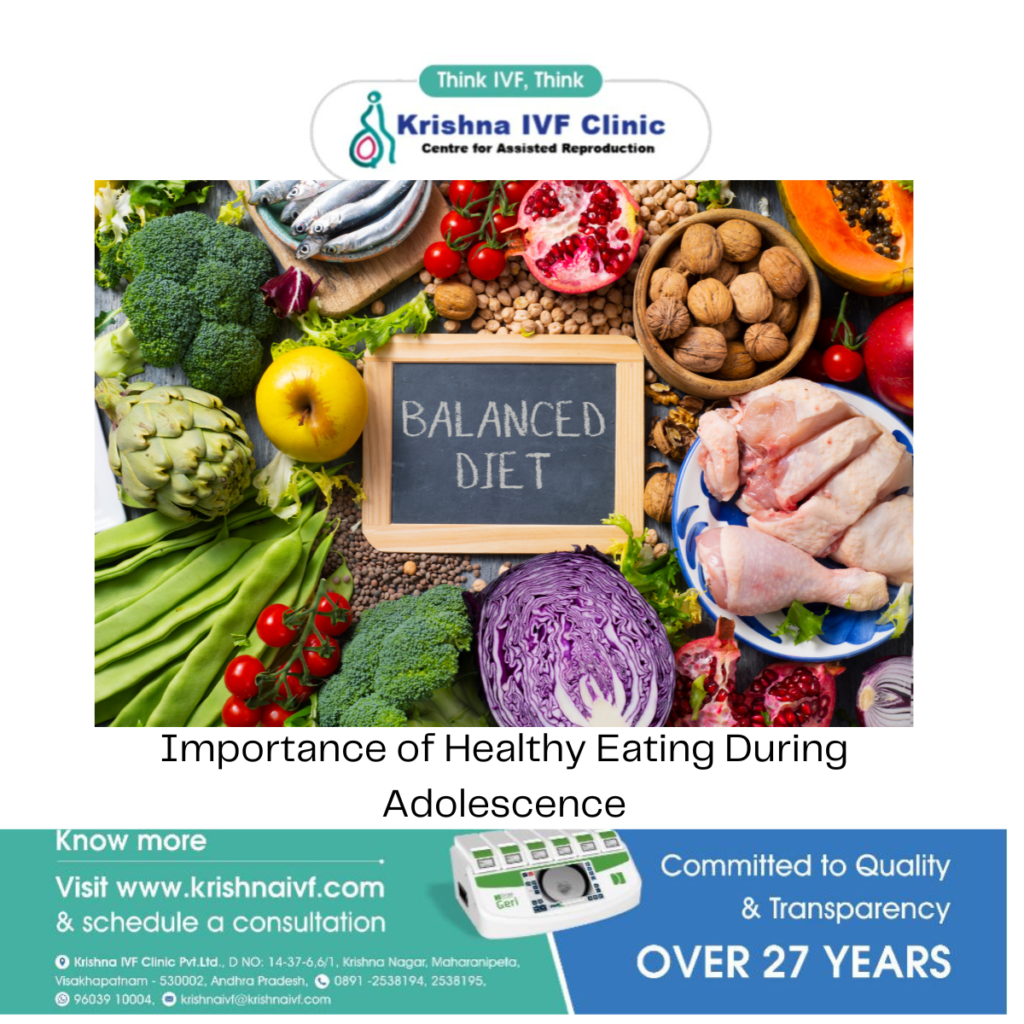Nutritional Requirements for Adolescents: Building a Strong Foundation for the Future
“Adolescence is a crucial period of growth and development, and nutrition plays a vital role in ensuring that teens reach their full potential. During these years, the body undergoes significant changes, such as rapid growth spurts, hormonal shifts, and the development of bone and muscle mass. To support these changes, adolescents need a diet rich in essential nutrients. Let’s explore the critical nutritional requirements that can help adolescents build a strong foundation for a healthy future. “The Importance of Vegetables and Fruits
– Dr. G. A. Ramaraju DNB PhD, Consultant Krishna IVF Clinic
Eating plenty of vegetables and fruits is important for a healthy adolescent diet. These foods are packed with essential vitamins, minerals, fiber, and antioxidants that are necessary for overall health and well-being. Adolescents should aim to consume 2.5 to 3 cups of vegetables and 1.5 to 2 cups of fruits every day in order to get a wide variety of nutrients, including vitamin C, potassium, and folate.
Vegetables such as leafy greens, carrots, and bell peppers provide vital nutrients that support eye health, immune function, and skin health. Fruits, especially those rich in vitamin C like oranges, strawberries, and kiwis, help the body absorb iron and support a strong immune system. Encouraging teens to eat a colorful variety of fruits and vegetables makes meals more appealing and ensures they receive a broad spectrum of nutrients.

The Role of Dairy Products in Bone Health
Dairy products are an important source of calcium and vitamin D, which are essential for bone health. During adolescence, bones grow rapidly, and it’s important to consume enough calcium to build bone density and prevent osteoporosis later in life. Teens should aim to consume three servings of dairy daily, such as milk, yogurt, or cheese.

For those who are lactose intolerant or prefer not to consume dairy, fortified plant-based alternatives like almond milk, soy milk, or calcium-fortified juices can offer similar benefits. It’s important to choose options fortified with vitamin D, as this nutrient helps the body absorb calcium more effectively. Without sufficient vitamin D, adolescents may be at risk of developing weak bones and other health issues. Ensuring Adequate Protein Intake/
Protein is a crucial nutrient for adolescents, especially those who do not consume enough dairy products. Protein supports muscle growth, tissue repair, and the production of enzymes and hormones. Adolescents require between 5.5 to 7 ounces of protein daily, depending on their age, gender, and activity level.
Good sources of protein include lean meats, poultry, fish, eggs, beans, lentils, and tofu. Vegetarians and vegans need to combine different plant-based proteins to ensure they are getting all the essential amino acids their bodies require. For example, combining beans with rice or hummus with whole-grain bread can provide a complete protein profile.
Addressing Iron and Vitamin D Deficiencies
Iron and vitamin D are two nutrients that are often lacking in adolescent diets, particularly for girls who experience menstrual blood loss and teens with limited sun exposure. Iron is essential for producing hemoglobin, which carries oxygen in the blood. A deficiency can lead to anemia, causing fatigue, weakness, and poor concentration.
Adolescents should consume iron-rich foods such as lean meats, poultry, fish, beans, and fortified cereals to prevent iron deficiency. It’s also beneficial to pair these foods with vitamin C-rich foods like oranges or tomatoes to enhance iron absorption.

Vitamin D, often called the “sunshine vitamin,” is crucial for calcium absorption and bone health. Since it can be challenging to get enough vitamin D from food alone, especially during the winter months, a combination of fortified foods and safe sun exposure is recommended. A vitamin D supplement may sometimes be necessary, particularly for those living in northern latitudes or with limited sun exposure.
Conclusion
It is crucial to meet the nutritional needs of adolescents to support their growth, development, and long-term health. To achieve this, it is important to focus on a diet that includes plenty of vegetables, fruits, dairy, and protein, while also addressing common deficiencies such as iron and vitamin D. By doing so, parents and caregivers can help their teens establish healthy eating habits that will benefit them for a lifetime. Encouraging a balanced, nutrient-dense diet at this stage will pave the way for a healthier and happier adulthood.
